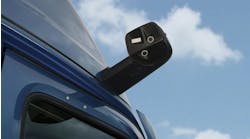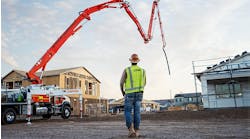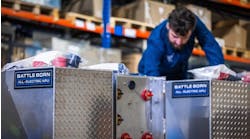"Game changing" predictive maintenance coming soon, DTNA exec says
YOUNTVILLE, CA. For several years now truck makers have touted the advantages of telematics, or the ability to monitor, record and relay vehicle performance data to improve operations. Likewise, sensors and wireless communication technology can report engine problems from a vehicle still on the road and streamline the repair process. The next step: to translate that data stream into uptime, to fix a truck before it’s broken—and that’s coming soon, say executives with Daimler Trucks North America and Zonar Systems Inc.
“We need to get very focused on all of this data that we generate. In the end, we need to be smart enough to turn our big data into predictive maintenance procedures for our customers,” Friedrich Baumann, DTNA senior vice president, aftermarket, told trucking editors gathered here Tuesday. “That will be, in my opinion, the next really big game changer in our industry.”
Speaking later with Fleet Owner, Baumann explained that the process has been “iterative,” with the data analysis portion currently under way. The next step will be to provide “hints” and recommendations to customers as to optimizing performance and anticipating problems. The advantage is that few fleets can generate sufficient data on their own, to say nothing of having the expertise to make sense of it all.
So, instead of a maintenance manager relying on some hard-won experience and intuition, hard numbers will be available.
“Especially the smaller guys who run 25 or 30 trucks, if they get data that’s based on a pool of 100,000 trucks, they feel much more comfortable making decisions,” Baumann said.
He anticipates this “passive” phase will become a reality within the next 24 months.
The “active” phase will incorporate that big data performance history with a real-time, on-the-road telematics and diagnostic capability. That technology will be in trucks within five years, “maximum,” he estimates.
“We are working very hard on this,” Baumann said.
Indeed, the Detroit Connectivity platform has been made a Daimler priority. Matthew Pfaffenbach, director of telematics for DTNA, explained that he now has a direct line to CEO Martin Daum—and the resources to push the program.
“The value of these technologies is not necessarily in the hardware, or in the connection with the truck, or the acquisition of data,” Pfaffenbach said. “It’s really what people do to interpret that data.”
Similarly, the ability to decipher that "big mess" and actually "do things that are meaningful" is the future, added Zonar President and CEO Brett Binton.
"Right now, Virtual Technician is reactive, and it’s been very successful. But the next frontier is predictive," Brinton said. "We have done prototype tests and we can tell when a turbocharger is going to go out. We can tell when a failure is going to occur with DEF system. That’s an example of what we can do. What's coming is just amazing."
The comments came as part of press program that included an update on DTNA’s telematics strategy.
Last month, DTNA and Zonar announced that DTNA became a minority investor in Zonar. DTNA and Zonar will continue to operate as separate business entities, but will leverage their new relationship to co-develop new products for DTNA’s customers.
Detroit Connect will transition the branding of its Visibility Fleet Software and On-Board Tablet to Zonar. With this change, Visibility will take on Zonar’s Ground Traffic Control fleet tracking application product name, and the Tablet will assume the 2020 tablet branding. Current Visibility and Tablet customers will experience no changes in product capabilities or pricing.
The Detroit Virtual Technician on-board diagnostic system will maintain the same branding and will remain under the Detroit Connect umbrella.
Pfaffenbach also hinted about the coming Vehicle Connectivity Platform, a new project that is both an onboard device and a back office solution.
“Whatever we create from a telematics platform also has to be able to integrate with third parties and with our customers’ fleets,” he said. “It has no value if you’re not linking those parties together.”


